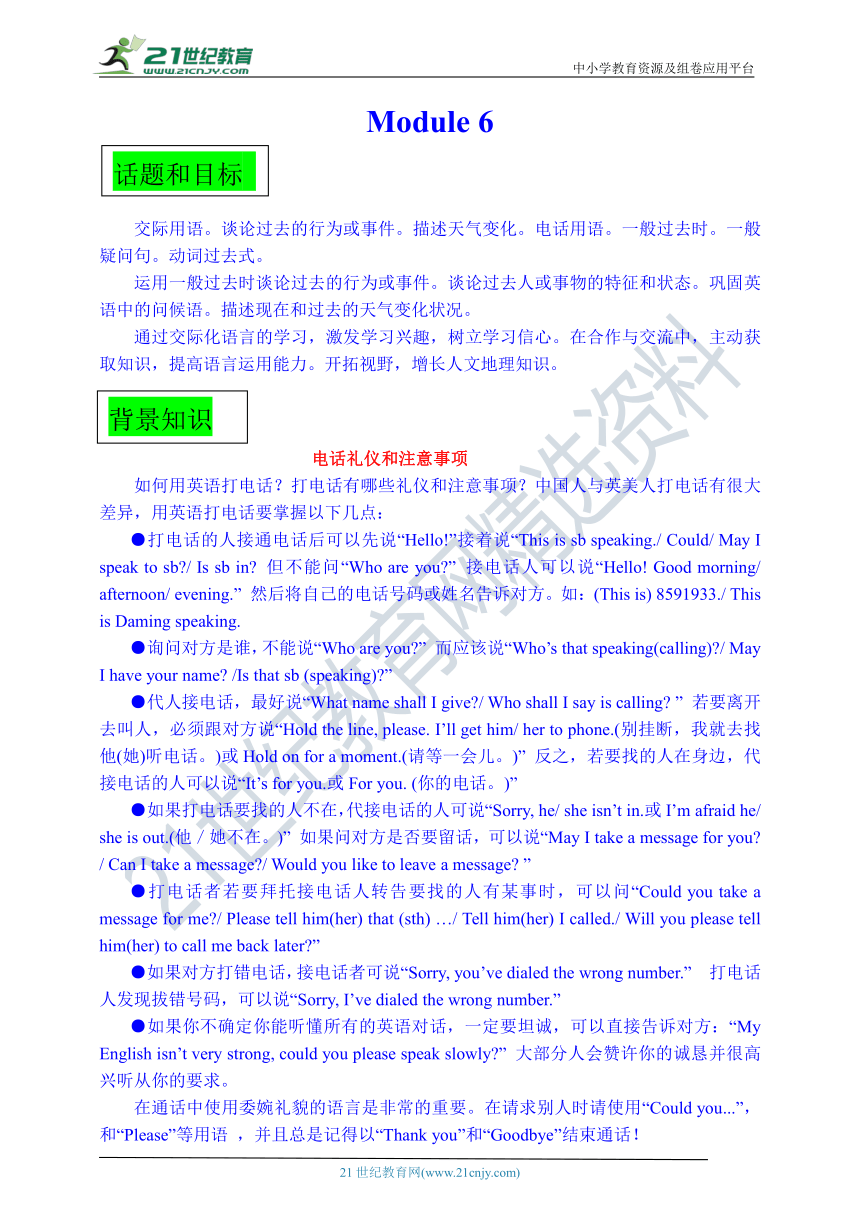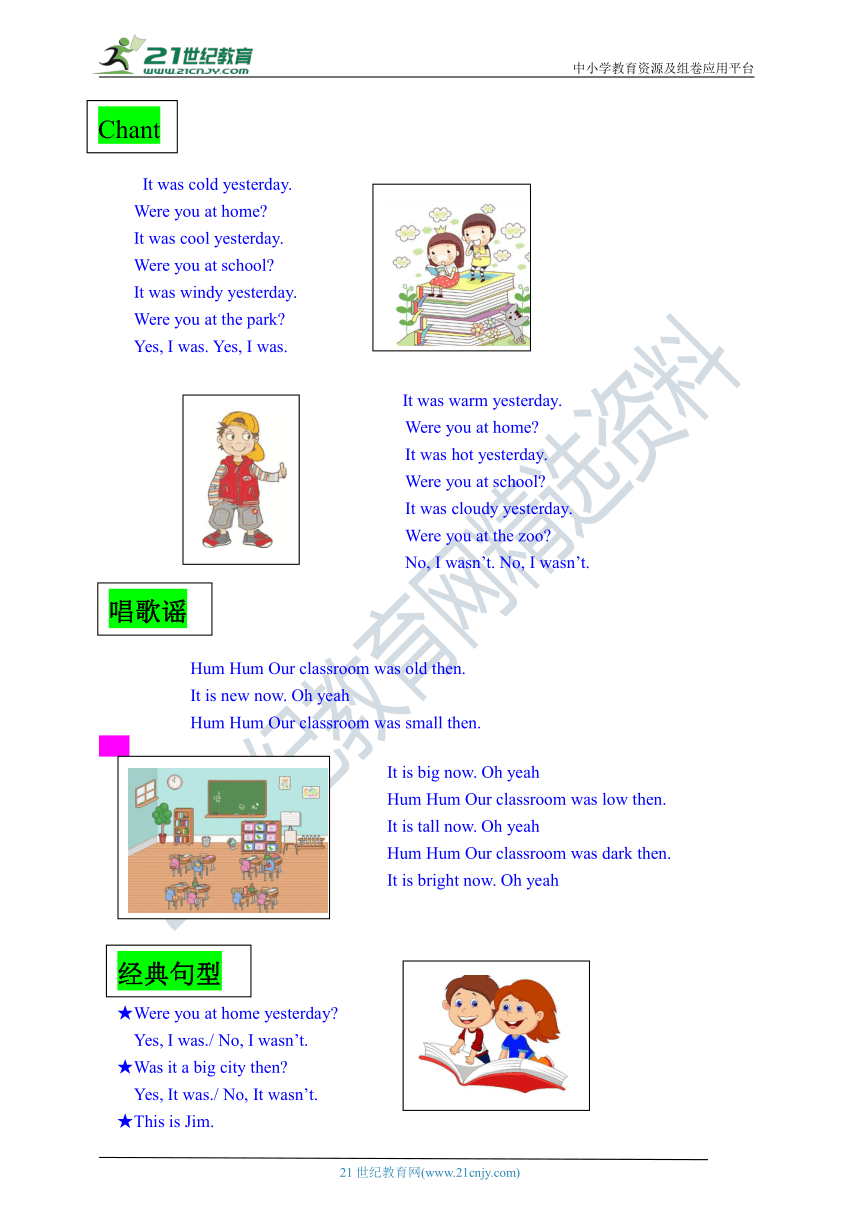外研版(三年级起点)四年级下学期用Module 6趣味英语读和练(含答案)
文档属性
| 名称 | 外研版(三年级起点)四年级下学期用Module 6趣味英语读和练(含答案) |  | |
| 格式 | doc | ||
| 文件大小 | 2.0MB | ||
| 资源类型 | 试卷 | ||
| 版本资源 | 外研版(三年级起点) | ||
| 科目 | 英语 | ||
| 更新时间 | 2021-11-25 15:42:57 | ||
图片预览


文档简介
中小学教育资源及组卷应用平台
Module 6
交际用语。谈论过去的行为或事件。描述天气变化。电话用语。一般过去时。一般疑问句。动词过去式。
运用一般过去时谈论过去的行为或事件。谈论过去人或事物的特征和状态。巩固英语中的问候语。描述现在和过去的天气变化状况。
通过交际化语言的学习,激发学习兴趣,树立学习信心。在合作与交流中,主动获取知识,提高语言运用能力。开拓视野,增长人文地理知识。
电话礼仪和注意事项
如何用英语打电话?打电话有哪些礼仪和注意事项?中国人与英美人打电话有很大差异,用英语打电话要掌握以下几点:
●打电话的人接通电话后可以先说“Hello!”接着说“This is sb speaking./ Could/ May I speak to sb / Is sb in 但不能问“Who are you ” 接电话人可以说“Hello! Good morning/ afternoon/ evening.” 然后将自己的电话号码或姓名告诉对方。如:(This is) 8591933./ This is Daming speaking.
●询问对方是谁,不能说“Who are you ” 而应该说“Who’s that speaking(calling) / May I have your name /Is that sb (speaking) ”
●代人接电话,最好说“What name shall I give / Who shall I say is calling ” 若要离开去叫人,必须跟对方说“Hold the line, please. I’ll get him/ her to phone.(别挂断,我就去找他(她)听电话。)或Hold on for a moment.(请等一会儿。)” 反之,若要找的人在身边,代接电话的人可以说“It’s for you.或For you. (你的电话。)”
●如果打电话要找的人不在,代接电话的人可说“Sorry, he/ she isn’t in.或I’m afraid he/ she is out.(他/她不在。)” 如果问对方是否要留话,可以说“May I take a message for you / Can I take a message / Would you like to leave a message ”
●打电话者若要拜托接电话人转告要找的人有某事时,可以问“Could you take a message for me / Please tell him(her) that (sth) …/ Tell him(her) I called./ Will you please tell him(her) to call me back later ”
●如果对方打错电话,接电话者可说“Sorry, you’ve dialed the wrong number.” 打电话人发现拔错号码,可以说“Sorry, I’ve dialed the wrong number.”
●如果你不确定你能听懂所有的英语对话,一定要坦诚,可以直接告诉对方:“My English isn’t very strong, could you please speak slowly ” 大部分人会赞许你的诚恳并很高兴听从你的要求。
在通话中使用委婉礼貌的语言是非常的重要。在请求别人时请使用“Could you...”,和“Please”等用语 ,并且总是记得以“Thank you”和“Goodbye”结束通话!
It was cold yesterday.
Were you at home
It was cool yesterday.
Were you at school
It was windy yesterday.
Were you at the park
Yes, I was. Yes, I was.
It was warm yesterday.
Were you at home
It was hot yesterday.
Were you at school
It was cloudy yesterday.
Were you at the zoo
No, I wasn’t. No, I wasn’t.
Hum Hum Our classroom was old then.
It is new now. Oh yeah
Hum Hum Our classroom was small then.
It is big now. Oh yeah
Hum Hum Our classroom was low then.
It is tall now. Oh yeah
Hum Hum Our classroom was dark then.
It is bright now. Oh yeah
★Were you at home yesterday
Yes, I was./ No, I wasn’t.
★Was it a big city then
Yes, It was./ No, It wasn’t.
★This is Jim.
★Are you at home now
Yes, I am./ No, I’m not.
★Was it sunny in London
★Where is he
A: Hello, Kate. This is Tony.
B: Hello, Tony. Are you at home now
A: No, I’m not. I’m out with my uncle.
B: Where are you
B: I’m in Sanya.
A: Is Sanya a beautiful city now
B: Yes! Very beautiful!
A: Was it beautiful then
B: No. It was a very small town then.
A: How about now
B: Now It’s big and beautiful. The streets are new and wide. There are many tall
buildings. There are lots of flowers, grass and trees in the city. And there are beautiful beaches.
A: Oh. What’s the weather like in Sanya
B: It’s warm.
A: Sanya is a wonderful place.
助你提升阅读能力的九个好习惯
好的英语是“读”出来的,只有读得多的人,才能真正学好英语。只有提升阅读能力,才能通过阅读学好英语。但阅读习惯很重要,如果你具备了下面的九个好习惯,相信你一定能快速提升你的阅读能力。
1. 选择难度适中的读物。一般来说,每篇读
物生词不要超过3个,生词多了对读物难以理解,
还会影响你的阅读速度和效果。
2. 选择一些与课本相关的情景对话和短文。
这类情景对话和短文有助于你对课本知识进行
复习巩固,还能让你读起来轻松愉悦。
3. 阅读时既不要默读,也不要大声读,声音不大不小为宜。
4. 阅读时,视线应与读物成垂直线,并充分发挥视线的“余光”作用,浏览下一句。
5. 要聚精会神地阅读,阅读必须有注意力和专注力。
6. 阅读时,抓住实质性的关键词,关键词是阅读时应弄通的重点。要有理解地阅读,关键是理解整篇读物的意义。
7. 在阅读中,运用要领记忆的基本方法,有目的地去记。不必去记无关紧要的词句,但要记住作者意图及内容实质。
8. 每天阅读的定额标准——一段情景对话和一篇短文。
9. 经常训练自己的阅读能力,持之以恒,便能巩固已经取得的成果。
yesterday是怎么来的
yesterday来自古英语giestran/ geostran 'yesterday' + daeg 'day'。giestran/ geostran原来就指“昨天”,以后逐渐演变为yester, 并且只用作组合语素,表示“昨”、“上”、“去”等,构成yestereve/ yesterevening (昨晚),yestermorn/ yestermorning(昨天早晨),yesternight(昨夜),yesternoon (昨天正午), yesterweek(上周), yesteryear(去年)等词。这些词现在已经都废弃不用了。因此,看来day加到yester上还是符合逻辑的,尽管yester本身原就包含“昨天”之意。
养家糊口的“bring home the bacon”
bacon是“熏猪肉”的意思,它是英国人饭桌上常见的一种食物。bring home the bacon的字面意思是“把培根带回家”,但是其含义和这种事物无关,而是指“在外挣钱,从而维持家庭生计”,也就是“养家糊口”的意思。例如:
I am young, but I can bring home the bacon.
我年轻,但我能养家糊口。
Tom works hard because he must bring home the bacon.
汤姆工作努力,因为他要养家糊口。
找答语,找出能回答左边句子的答语,将字母代号填在括号中。
( )1. How are you A. I am in the zoo.
( )2. Were you at school yesterday B. No, it wasn’t.
( )3. Where are you C. Fine, thanks.
( )4. Are you at home now D. No, I wasn’t.
( )5. Was it big then E. No, I’m not.
“考点演练”参考答案
Module 6
1. C 2. D 3. A 4. E 5. B
话题和目标
背景知识
Chant
唱歌谣
经典句型
情景对话
学习方略
英语知识窗
经典英语
考点演练
21世纪教育网 www.21cnjy.com 精品试卷·第 2 页 (共 2 页)
HYPERLINK "http://21世纪教育网(www.21cnjy.com)
" 21世纪教育网(www.21cnjy.com)
Module 6
交际用语。谈论过去的行为或事件。描述天气变化。电话用语。一般过去时。一般疑问句。动词过去式。
运用一般过去时谈论过去的行为或事件。谈论过去人或事物的特征和状态。巩固英语中的问候语。描述现在和过去的天气变化状况。
通过交际化语言的学习,激发学习兴趣,树立学习信心。在合作与交流中,主动获取知识,提高语言运用能力。开拓视野,增长人文地理知识。
电话礼仪和注意事项
如何用英语打电话?打电话有哪些礼仪和注意事项?中国人与英美人打电话有很大差异,用英语打电话要掌握以下几点:
●打电话的人接通电话后可以先说“Hello!”接着说“This is sb speaking./ Could/ May I speak to sb / Is sb in 但不能问“Who are you ” 接电话人可以说“Hello! Good morning/ afternoon/ evening.” 然后将自己的电话号码或姓名告诉对方。如:(This is) 8591933./ This is Daming speaking.
●询问对方是谁,不能说“Who are you ” 而应该说“Who’s that speaking(calling) / May I have your name /Is that sb (speaking) ”
●代人接电话,最好说“What name shall I give / Who shall I say is calling ” 若要离开去叫人,必须跟对方说“Hold the line, please. I’ll get him/ her to phone.(别挂断,我就去找他(她)听电话。)或Hold on for a moment.(请等一会儿。)” 反之,若要找的人在身边,代接电话的人可以说“It’s for you.或For you. (你的电话。)”
●如果打电话要找的人不在,代接电话的人可说“Sorry, he/ she isn’t in.或I’m afraid he/ she is out.(他/她不在。)” 如果问对方是否要留话,可以说“May I take a message for you / Can I take a message / Would you like to leave a message ”
●打电话者若要拜托接电话人转告要找的人有某事时,可以问“Could you take a message for me / Please tell him(her) that (sth) …/ Tell him(her) I called./ Will you please tell him(her) to call me back later ”
●如果对方打错电话,接电话者可说“Sorry, you’ve dialed the wrong number.” 打电话人发现拔错号码,可以说“Sorry, I’ve dialed the wrong number.”
●如果你不确定你能听懂所有的英语对话,一定要坦诚,可以直接告诉对方:“My English isn’t very strong, could you please speak slowly ” 大部分人会赞许你的诚恳并很高兴听从你的要求。
在通话中使用委婉礼貌的语言是非常的重要。在请求别人时请使用“Could you...”,和“Please”等用语 ,并且总是记得以“Thank you”和“Goodbye”结束通话!
It was cold yesterday.
Were you at home
It was cool yesterday.
Were you at school
It was windy yesterday.
Were you at the park
Yes, I was. Yes, I was.
It was warm yesterday.
Were you at home
It was hot yesterday.
Were you at school
It was cloudy yesterday.
Were you at the zoo
No, I wasn’t. No, I wasn’t.
Hum Hum Our classroom was old then.
It is new now. Oh yeah
Hum Hum Our classroom was small then.
It is big now. Oh yeah
Hum Hum Our classroom was low then.
It is tall now. Oh yeah
Hum Hum Our classroom was dark then.
It is bright now. Oh yeah
★Were you at home yesterday
Yes, I was./ No, I wasn’t.
★Was it a big city then
Yes, It was./ No, It wasn’t.
★This is Jim.
★Are you at home now
Yes, I am./ No, I’m not.
★Was it sunny in London
★Where is he
A: Hello, Kate. This is Tony.
B: Hello, Tony. Are you at home now
A: No, I’m not. I’m out with my uncle.
B: Where are you
B: I’m in Sanya.
A: Is Sanya a beautiful city now
B: Yes! Very beautiful!
A: Was it beautiful then
B: No. It was a very small town then.
A: How about now
B: Now It’s big and beautiful. The streets are new and wide. There are many tall
buildings. There are lots of flowers, grass and trees in the city. And there are beautiful beaches.
A: Oh. What’s the weather like in Sanya
B: It’s warm.
A: Sanya is a wonderful place.
助你提升阅读能力的九个好习惯
好的英语是“读”出来的,只有读得多的人,才能真正学好英语。只有提升阅读能力,才能通过阅读学好英语。但阅读习惯很重要,如果你具备了下面的九个好习惯,相信你一定能快速提升你的阅读能力。
1. 选择难度适中的读物。一般来说,每篇读
物生词不要超过3个,生词多了对读物难以理解,
还会影响你的阅读速度和效果。
2. 选择一些与课本相关的情景对话和短文。
这类情景对话和短文有助于你对课本知识进行
复习巩固,还能让你读起来轻松愉悦。
3. 阅读时既不要默读,也不要大声读,声音不大不小为宜。
4. 阅读时,视线应与读物成垂直线,并充分发挥视线的“余光”作用,浏览下一句。
5. 要聚精会神地阅读,阅读必须有注意力和专注力。
6. 阅读时,抓住实质性的关键词,关键词是阅读时应弄通的重点。要有理解地阅读,关键是理解整篇读物的意义。
7. 在阅读中,运用要领记忆的基本方法,有目的地去记。不必去记无关紧要的词句,但要记住作者意图及内容实质。
8. 每天阅读的定额标准——一段情景对话和一篇短文。
9. 经常训练自己的阅读能力,持之以恒,便能巩固已经取得的成果。
yesterday是怎么来的
yesterday来自古英语giestran/ geostran 'yesterday' + daeg 'day'。giestran/ geostran原来就指“昨天”,以后逐渐演变为yester, 并且只用作组合语素,表示“昨”、“上”、“去”等,构成yestereve/ yesterevening (昨晚),yestermorn/ yestermorning(昨天早晨),yesternight(昨夜),yesternoon (昨天正午), yesterweek(上周), yesteryear(去年)等词。这些词现在已经都废弃不用了。因此,看来day加到yester上还是符合逻辑的,尽管yester本身原就包含“昨天”之意。
养家糊口的“bring home the bacon”
bacon是“熏猪肉”的意思,它是英国人饭桌上常见的一种食物。bring home the bacon的字面意思是“把培根带回家”,但是其含义和这种事物无关,而是指“在外挣钱,从而维持家庭生计”,也就是“养家糊口”的意思。例如:
I am young, but I can bring home the bacon.
我年轻,但我能养家糊口。
Tom works hard because he must bring home the bacon.
汤姆工作努力,因为他要养家糊口。
找答语,找出能回答左边句子的答语,将字母代号填在括号中。
( )1. How are you A. I am in the zoo.
( )2. Were you at school yesterday B. No, it wasn’t.
( )3. Where are you C. Fine, thanks.
( )4. Are you at home now D. No, I wasn’t.
( )5. Was it big then E. No, I’m not.
“考点演练”参考答案
Module 6
1. C 2. D 3. A 4. E 5. B
话题和目标
背景知识
Chant
唱歌谣
经典句型
情景对话
学习方略
英语知识窗
经典英语
考点演练
21世纪教育网 www.21cnjy.com 精品试卷·第 2 页 (共 2 页)
HYPERLINK "http://21世纪教育网(www.21cnjy.com)
" 21世纪教育网(www.21cnjy.com)
同课章节目录
- Module 1
- Unit 1 She's a nice teache
- Unit 2 He's cool.
- Module 2
- Unit 1 London is a big city.
- Unit 2 It's very old.
- Module 3
- Unit 1 Robots will do everything.
- Unit 2 On Monday I'll go swimming.
- Module 4
- Unit 1 Will you take your kite?
- Unit 2 Will it be hot in Haikou?
- Module 5
- Unit 1 I was two then.
- Unit 2 They were young.
- Module 6
- Unit 1 Were you at home yesterday?
- Unit 2 Was it a big city then ?
- Module 7
- Unit 1 I helped Mum.
- Unit 2 Grandma cooked fish.
- Module 8
- Unit 1 They sang beautifully.
- Unit 2 I took some pictures.
- Module 9
- Unit 1 Did he live in New York ?
- Unit 2 Did you have a nice holiday?
- Review Module
- Unit 1
- Unit 2
- Module 10
- Unit 1 Did you fall off your bike?
- Unit 2 Sam had lots of chocolate.
